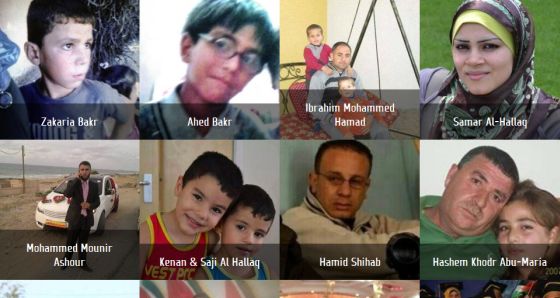Ayman Mohyeldin reports: Hassan Al Hallaq did what any sensible parent would do: When the latest bout of violence erupted here, he moved his family — heavily pregnant wife, Samar, and two young sons — away from their apartment on the outskirts of town and into the middle of Gaza City.
Away from the border, away from the tunnels, the rockets and the front line, Al Hallaq thought his wife and sons Kenan, 6, and four-year-old Saji would be safe.
The IT manager at a Palestinian bank had lived with his family through two previous wars and knew his neighborhood in East Gaza would be targeted by the Israelis because it is close to the border.
Category Archives: Palestinian Territories
Israel is not my birthright
Shira Lipkin: I’m writing this in my new baby niece’s room. I am here in Florida visiting my family because of this niece, this tiny pudgy innocent baby. We are Jewish, and it’s time for my niece to receive her Hebrew name in a sweet little ceremony at our longtime synagogue.
Last night I sat at the synagogue next to my 19-year-old daughter. I felt a swell of joy as the services began; I’d been away too long. I’d loved services as a child and teenager.
And then we hit the first mention of Israel as the Promised Land, and I burst into tears.
On the way to services, I’d caught up on Twitter a bit. I’d read about the Israeli missiles still falling on Palestine. I’d read about the outright murder of Palestinian children.
And I sat there and listened to the rabbi call Israel our Promised Land, and it broke something in me.
I am an American Jew of a certain age (40), and what that means is that I was raised to believe that Israel was ours by divine right.
It sounds ridiculous when you say it aloud. Especially because, like many of my generation of Jews, I’m not particularly religious. Many Jews my age slid into paganism, a sort of ambivalent agnosticism, or outright atheism; we are cultural Jews rather than religious Jews. And yet when I first spoke about the conflict between Israel and Palestine some years ago, I found that falling out of my mouth – that God promised us Israel. It’s ours because God said so.
My daughter, trying to comfort me after the services, said, “Maybe it is the Promised Land, just not right now.”
My daughter is an atheist. And the narrative got her, too.
The history we are taught in our Sunday school is that we were there first, and that therefore the Palestinians are occupying our land. How long ago were we there, though? And who, exactly, is we? I find myself using that we – “We need to stop bombing Palestine,” “we need to give land back,” but I am not Israeli. I have never been to Israel. This is how deep it runs, this idea of possession. [Continue reading…]
Bibi = Bashar
I remember being shocked by Syria's devastation. What I saw today in Gaza's Shejaeih area was virtually indistinguishable
— Hugh Naylor (@HughNaylor) July 26, 2014
When Bashar al-Assad proceeded to destroy Homs and other Syrian cities, President Obama and other Western leaders declared, “Assad must go.”
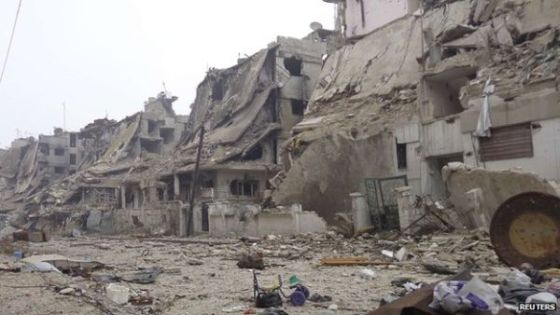
Homs, Syria
When Benjamin Netanyahu ordered the IDF to destroy Shujaiyah while killing hundreds of Palestinians across the Gaza Strip, President Obama and other Western leaders declared, “Israel has the right to defend itself.”
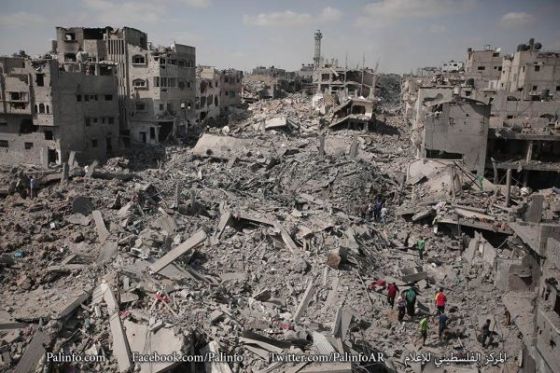
Shujaiyah, Gaza
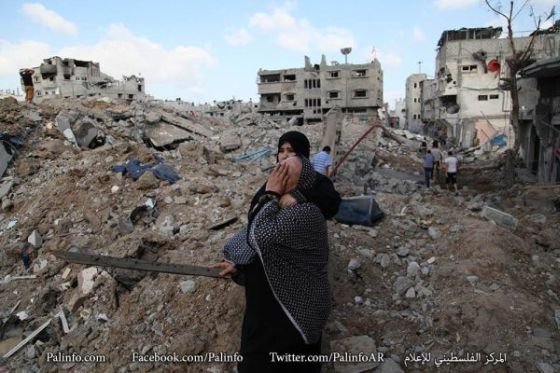
Shujaiyah, Gaza
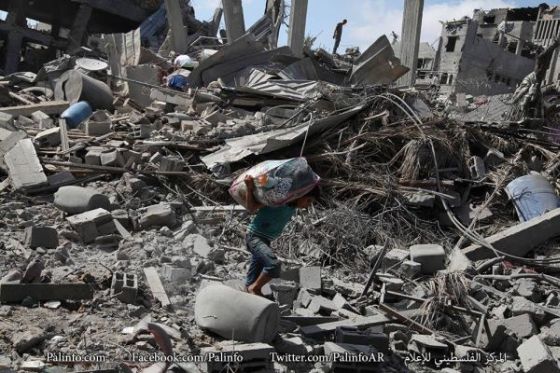
Shujaiyah, Gaza
In its response to the suffering of the people in Gaza and in Syria, the West has once again shown its impotence and moral bankruptcy.
Jon Snow: The children of Gaza
Beyond Numbers: Remembering the victims of Israeli operation ‘Protective Edge’ on Gaza
The Beyond Numbers platform aims to remember all innocent victims of the Israeli Operation “Protective Edge” on Gaza, launched on July 8, 2014. Each picture portrays a victim and his/her story, rather than a number to add to the death count.
The platform is regularly updated by Palestinians living in the conflict zone through the website’s proprietary crowdsourcing interface. The hope is to inspire the world to take action and call for the end of the violence.
Israeli police reveal Netanyahu’s pretext for war on Gaza was false
Daily Dot: The recent explosion of violence in Gaza may have been initially sparked by false or inaccurate claims, according to Israeli police.
The ongoing conflict began last month when three Israeli teenagers were kidnapped from a Jewish settlement in the occupied West Bank. Their bodies were later discovered in a field outside the city of Hebron. Before police were able to determine who was responsible, Israeli Prime Minister Benjamin Netanyahu placed blame for the tragic deaths squarely on Hamas, Gaza’s elected political leadership—an accusation that may prove to be false.
On Friday, Chief Inspector Micky Rosenfeld, foreign press spokesman for the Israel Police, reportedly told BBC journalist Jon Donnisonhe that the men responsible for murders were not acting on orders of Hamas leadership. Instead, he said, they are part of a “lone cell.” Further, Inspector Rosenfeld told Donnison that if Hamas’ leadership had ordered the kidnapping, “they’d have known about it in advance.”
Israeli police MickeyRosenfeld tells me men who killed 3 Israeli teens def lone cell, hamas affiliated but not operating under leadership1/2
— Jon Donnison (@JonDonnison) July 25, 2014
Seems to contradict the line from Netanyahu government. 2/2
— Jon Donnison (@JonDonnison) July 25, 2014
“Hamas is responsible, and Hamas will pay,” Netanyahu said in reference to the kidnapping. However, Inspector Rosenfeld’s statements, along with a number of reports concerning the identities of known police suspects, seem to indicate that Hamas leadership was not involvement in the vicious crime.
Channel 4 News: Today’s ‘day of rage’ in the West Bank
The right of armed resistance
Giles Fraser, who is a priest in the Church of England, founder of the Inclusive Church, and has lectured on moral leadership to the British Army, writes: For decades now the United Nations has been unable to agree a definition of terrorism. Even our own supreme court recently concluded that there is no internationally agreed definition. The stumbling block has been that western governments want states and state agents to be exempt from any definition. And a number of Islamic counties want some national liberation movements exempt.
Or, to put it in terms of today’s news: the Israelis won’t have any definition that would make them terrorists for bombing old people’s homes in Gaza, and West Bank Palestinians won’t have any definition that will make them terrorists for fighting back against occupation with petrol bombs. Writing in his annual report this week, David Anderson QC, the government’s independent reviewer of terrorism legislation, sounds exasperated: “The intractability of some of these questions has induced a degree of defeatism among those seeking to define terrorism.”
I am eating aubergines and flatbread with Dr Samah Jabr in a cool Palestinian cafe in Stoke Newington. A psychiatrist and psychotherapist who works out of East Jerusalem, Dr Jabr is quietly spoken, modest, and perhaps just a little bit shocked by my lapses into overly colourful language. She is an educated, middle-class Palestinian (in no way a rabble-rouser) but she insists that the word terrorist has become a powerful – though often un-thought-through – political pejorative employed to discredit legitimate resistance to the violence of occupation.
What some would call terrorism, she would call a moral duty. She gives me her paper on the subject. “Why is the word ‘terrorist’ so readily applied to individuals or groups who use homemade bombs, but not to states using nuclear and other internationally proscribed weapons to ensure submission to the oppressor?” she asks. She insists that violent resistance must be used in defence and as a last resort. And that it is important to distinguish between civilian and military targets. “The American media call our search for freedom ‘terrorism’,” she complains, “despite the fact that the right to self-determination by armed struggle is permissible under the UN charter’s article 51, concerning self-defence.” [Continue reading…]
Israel rejects Kerry’s Gaza ceasefire plan
Reuters reports: Israel Prime Minister Benjamin Netanyahu’s security cabinet has rejected proposals for a ceasefire in the Gaza Strip and is seeking changes to the plans, a government source said on Friday.
U.S. Secretary of State John Kerry has been pushing for a halt to 18 days of fighting between Israel and Hamas Islamist militants in the Gaza Strip.
Full details of the proposed truce have not been released, but the government official, who declined to be named, said Israel wanted modifications before agreeing to any end to hostilities. Hamas has yet to respond to the proposed ceasefire.
Why Israel is losing the media war
David Zurawik writes: Israel is losing the public relations war over its action in Gaza in a way I cannot remember seeing in any of its recent military actions. And part of that is due to the suffering of Palestinian civilians being depicted with an unprecedented sensitivity and prominence — at least, in American media.
More journalists in Gaza and more social media are among the reasons given for the change.
“There were only a couple Western journalists in Gaza when Israel invaded in 2008,” says Michael Calderone, Huffington Post senior media reporter. “Now, there are dozens covering every air strike in real-time through social media, complete with graphic images of Palestinian civilians, and even children, being killed and injured. So there’s a disconnect between Israeli officials’ repeated claims on TV about fighting terrorism and extensive footage we’re seeing of Israel bombing schools, shelters and hospitals in Gaza.”
As Calderone sees it, such images have upended traditional packaging of stories out of Gaza.
“The American public may have seen a few stray images or video clips from Gaza in the past as part of a TV package, but such scenes would be interspersed with the views from experts and government officials,” he said in an email to The Sun. “A network correspondent now can take a heartbreaking video of a Palestinian mother grieving for her lost son, post it on Facebook, and the video will go viral several hours before the evening newscast.”
An online headline from New York Magazine last week put it this way: “‘Telegenically dead Palestinians:’ Why Israel is losing the American media war.”
No one is doing a more thorough job of covering the death and destruction in Gaza than Al Jazeera. Social media are absolutely a driving force in the shift in coverage, but I also believe the heavy presence of Al Jazeera and the excellent work its correspondents and producers are doing have raised the games of all the news organizations on the ground. [Continue reading…]
Sunbathing while the IDF massacres Palestinians
Incredible. You'd never know that an hour south a war is raging. #Israel #Gaza pic.twitter.com/CLtaF6LXgm
— Alexander Marquardt (@MarquardtA) July 24, 2014
#48KMarch to Jerusalem — start of the Third Intifada?
Clashes have been ongoing in #Nablus, #Jerusalem, #Ramallah, #Bethlehem as thousands of Palestinians resist Israeli forces #48KMarch #Gaza
— PalestineNewsNetwork (@pnnenglish) July 24, 2014
#Jerusalem, other cities accross West Bank boiling with angry protests against #Israel attacks on #Gaza: Netanyahu brought a 3rd #Intifada
— Fadi Al-Qadi (@fqadi) July 24, 2014
More Hamas flags in Nablus tonight. Not looking good for the PA. pic.twitter.com/FzZhQ24PIT
— Nathan Thrall (@nathanthrall) July 24, 2014
Witness sees Israeli soldiers using Palestinians as human shields
Account from Gazan in Khan Younis says Israeli soldiers using locals as human shields: via @MaxBlumenthal https://t.co/4NK8YPOF98
— arabist (@arabist) July 24, 2014
I saw no evidence of Hamas using Palestinians as human shields
The BBC’s Middle East editor, Jeremy Bowen, writes: I saw Binyamin Netanyahu, Israel’s prime minister, giving an interview to the BBC after Israel had killed more than 60 people in the Gaza district of Shejaiya. He said he regretted the civilian casualties in Gaza but they were the fault of Hamas. Netanyahu said Israel had warned people to get out. Some had taken the advice; others had been prevented from leaving by Hamas.
I was back in London for my son’s 11th birthday party by the time all those people were killed in Shejaiya. But my impression of Hamas is different from Netanyahu’s. I saw no evidence during my week in Gaza of Israel’s accusation that Hamas uses Palestinians as human shields. I saw men from Hamas on street corners, keeping an eye on what was happening. They were local people and everyone knew them, even the young boys. Raji Sourani, the director of the Palestinian Centre for Human Rights in Gaza, told me that Hamas, whatever you think of it, is part of the Palestinian DNA.
I met Sourani first when he was condemning abuses by Yasser Arafat’s men. He has taken an equally tough stance on Hamas. Now he says Israel is violating the laws of war by ignoring its legal duty to treat Palestinian civilians as protected non-combatants. [Continue reading…]
Why are so few Israeli journalists questioning their military’s assault on Gaza?
Janine Zacharia writes: When Israel launched Operation Cast Lead in 2008 to stop Hamas rocket fire from the Gaza Strip, Israeli journalists were hungry to cover the military operational details. They wanted to know how many Hamas militants had been killed or captured, what of the terrorist group’s infrastructure had been hit, what remained on the Israel Defense Forces’ target list, and so on. What didn’t interest most newspapers or newscasts was the wider impact on the other side, especially the civilian death toll. If there was any questioning, it wasn’t why so many Palestinians were being killed, but why the campaign hadn’t started sooner. By the time Israel launched Pillar of Defense, its next Gaza military offensive in 2012, the Israeli media watchdog group Keshev concluded that the war had “blurred the distinction between the IDF spokesperson and Israeli media outlets more than ever.”
The same can be said today.
Israeli journalists, many of whom I have known and admired during nearly two decades of reporting on this conflict, are skilled. They can be relentless questioners, brutal in their analysis, and still maintain their access to key figures. Give them a good old-fashioned financial or sex scandal and they’ll make that politician wish he’d never run for office. Just ask former Prime Minister Ehud Olmert or former President Moshe Katsav how the coverage of their trials went.
But in times of war, many, if not most, Israeli journalists — with some admirable exceptions — hunker down with the rest of the country and are afraid to ask tough questions, especially in the early days of a military campaign. Instead, they tend to parrot the country’s political and military leaders. (The Hebrew phrase critics have for journalists in these times is — meguyasim — the drafted, or recruited.) Israelis are barred from entering Gaza. And with that access cut off, few Israeli journalists have cultivated Palestinian sources because there is amazingly little interest among the Israeli public in understanding Palestinian affairs. [Continue reading…]
Israel’s relentless war on the children of Gaza
BBC News: At least 15 people have been killed and more than 200 injured when a UN-run school used as a shelter in Gaza was shelled, the Gaza health ministry says.
Hundreds of Palestinians were in the school in Beit Hanoun, fleeing heavy fighting in the area.
It is the fourth time that a UN school has been hit in Israel’s offensive against Hamas militants.
Israelis promoting the rape of Gaza and its women
A decade ago, BBC News reported: Women’s bodies have become part of the terrain of conflict, according to a new report by Amnesty International.
Rape and sexual abuse are not just a by-product of war but are used as a deliberate military strategy, it says.
The opportunistic rape and pillage of previous centuries has been replaced in modern conflict by rape used as an orchestrated combat tool.
So what motivates armed forces, whether state-backed troops or irregular militia, to attack civilian women and children?
Gita Sahgal, of Amnesty International, told the BBC News website it was a mistake to think such assaults were primarily about the age-old “spoils of war”, or sexual gratification.
Rape is often used in ethnic conflicts as a way for attackers to perpetuate their social control and redraw ethnic boundaries, she said.
“Women are seen as the reproducers and carers of the community,” she said.
“Therefore if one group wants to control another they often do it by impregnating women of the other community because they see it as a way of destroying the opposing community.”
David Sheen writes: As Israel’s latest assault on Gaza enters its third week, the destructive force unleashed upon the Strip has taken a massive toll, leaving over 650 Palestinians dead, over 4,200 wounded – mostly civilians – and over a hundred thousand homeless. As Gaza is pummeled, the level of anti-Palestinian racist incitement from top Israeli political, religious and cultural figures continues to ring at peak pitch, and has taken on a dangerous misogynistic tone.
On July 21, Israeli media reported that Dov Lior, Chief Rabbi of the West Bank settlement Kiryat Arba, issued a religious edict on the rules of engagement during wartime, which he sent to the country’s Defense Minister. The edict stated that according to Jewish religious law, it is permissible to bomb innocent Palestinian civilians and “to exterminate the enemy.”
While Lior is held in high regard, he is also associated with religious Zionism’s “conservative wing.” By contrast, David Stav, Chief Rabbi of the town of Shoham is considered to be a leader of religious Zionism’s “liberal” stream. In an op-ed published the same day news of Lior’s edict broke, Stav characterized the assault on Gaza as a holy war, which is mandated by the Torah itself and must be merciless.
While these leading religious figures called for wars of extermination, some secular Israelis suggested carrying out attacks of a more perverse nature.
The day after Lior and Stav made headlines, news emerged that the City Council of Or Yehuda, located in Israel’s coastal region, printed out and hung a banner supporting Israeli soldiers. The display included language suggesting the rape of Palestinian women. The text of the banner read: “Israeli soldiers, the residents of Or Yehuda are with you! Pound ‘their mother and come back home safely to your mother.” [Continue reading…]

